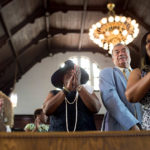WASHINGTON (RNS)—Antioch Missionary Baptist Church in Houston and 30 other Black churches have received a total of $4 million to help preserve their buildings and the Black history they represent.
The National Trust for Historic Preservation announced the second round of Preserving Black Churches grants from its African American Cultural Heritage Action Fund on Jan. 15, the national holiday honoring Martin Luther King Jr.
Along with the funds provided last year, the Action Fund has supported more than 70 historic churches with $8.7 million in grants.
“We created the Preserving Black Churches program to ensure the historic Black church’s legacy is told and secured,” said Brent Leggs, executive director of the fund, adding that “these cultural assets can continue to foster community resilience and drive meaningful change in our society.”
This year’s grants, which range from $50,000 to $200,000, will allow congregations to address issues such as mold contamination, demolition, water filtration and deferred maintenance.
Among the recipients this year is Town Clock Church in New Albany, Ind., which was constructed in 1852 and then named Second Presbyterian Church. It was a station on the Underground Railroad, providing shelter to enslaved people who were fugitives. Funds earmarked for endowment and financial sustainability will be used to maintain 2014 preservation and restoration efforts.
Others include African Methodist Episcopal churches that received capital project grants. For example, Atlanta’s Big Bethel AME Church was the birthplace of Morris Brown College, the first educational institution in Georgia owned completely by African Americans. New Orleans’ St. James AME Church was a gathering site for marchers of the Civil Rights Movement and the headquarters of the Louisiana Native Guards, Black Union soldiers who fought in the Civil War.
Historian Henry Louis Gates Jr., an adviser to the fund, supported by Lilly Endowment, welcomed the decisions on the new grant recipients, some of which currently have facilities that are closed due to structural damage.
“The heart of our spiritual world is the Black church,” Gates said. “These places of worship, these sacred cultural centers, must exist for future generations to understand who we were as a people.”














We seek to connect God’s story and God’s people around the world. To learn more about God’s story, click here.
Send comments and feedback to Eric Black, our editor. For comments to be published, please specify “letter to the editor.” Maximum length for publication is 300 words.